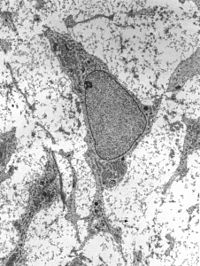
Photo from wikipedia
Abstract Senior individuals older than 65 years of age are at a disproportionally higher risk of developing pneumonia. Impaired capacity to defend against airway infections may be one of the… Click to show full abstract
Abstract Senior individuals older than 65 years of age are at a disproportionally higher risk of developing pneumonia. Impaired capacity to defend against airway infections may be one of the reasons. It is generally believed that weaker regulatory T cell responses may be beneficial to host defense against pathogens. In senior patients with community‐acquired bacterial pneumonia, we investigated the frequencies and functions of regulatory T cells. Interestingly, we found that compared to age‐ and sex‐matched healthy controls, senior pneumonia patients presented lower frequencies of Foxp3‐expressing and Helios‐expressing CD4+ T cells. The quantity of Foxp3 and Helios being expressed, measured by their mRNA transcription levels, was also lower in CD4+ T cells from pneumonia patients. Furthermore, following TCR and TGF‐&bgr; stimulation, pneumonia patients presented impaired capacity to upregulate Foxp3 and Helios. Functional analyses revealed that CD4+ T cells from pneumonia patients secreted lower amounts of IL‐10 and TGF‐&bgr;, two cytokines critical to regulatory T cell‐mediated suppression. Also, the expression of granzyme B and perforin, which were cytolytic molecules potentially utilized by regulatory T cells to mediate the elimination of antigen‐presenting cells and effector T cells, were reduced in CD4+CD25+ T cells from senior pneumonia patients. In addition, the CD4+CD25+ T cells from senior pneumonia patients presented reduced capacity to suppress effector CD4+ and CD8+ T cell proliferation. Moreover, the value of pneumonia severity index was inversely correlated with several parameters of regulatory T cell function. Together, our results demonstrated that senior pneumonia patients presented a counterintuitive impairment in regulatory T cell responses that was associated with worse prognosis.
Journal Title: Experimental Cell Research
Year Published: 2017
Link to full text (if available)
Share on Social Media: Sign Up to like & get
recommendations!